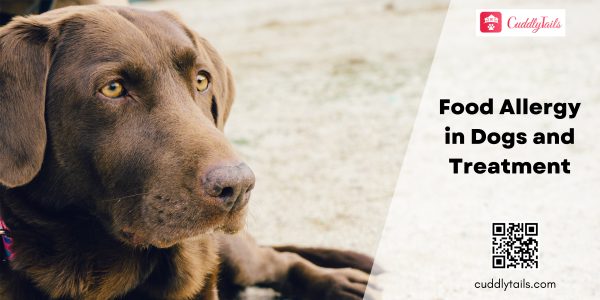Food Allergy in Dogs and Treatment
Food allergy in dogs can be a challenging and frustrating issue for both pets and their owners. Not only do they cause physical discomfort for your dog, but they also lead to a lot of confusion when it comes to diagnosis and treatment. Understanding the symptoms, causes, and available treatments for food allergies is essential for keeping your furry friend happy and healthy.
Understanding Food Allergies in Dogs
What Are Food Allergies in Dogs?
A food allergy in dogs occurs when their immune system mistakenly identifies a specific food ingredient as harmful, triggering an allergic reaction. It’s important to note the difference between food allergies and food intolerance. While allergies involve the immune system and can cause severe symptoms, intolerances are more about digestive upset without immune involvement.
How Do Dogs Develop Food Allergies?
Dogs develop food allergies when their immune system overreacts to a particular food. The body recognizes certain proteins as foreign invaders and mounts a defense, releasing chemicals like histamine that cause inflammation and discomfort.
Common Food Allergens for Dogs
Many common dog foods contain ingredients that can trigger allergic reactions. These allergens include:
Proteins
Chicken, beef, lamb, and fish are some of the most common culprits.
Grains
Wheat, soy, and corn are frequent causes of food allergies, especially in dogs with sensitive digestive systems.
Dairy Products
Milk, cheese, and other dairy items can also lead to allergic reactions in some dogs.
Common Symptoms of Food Allergies in Dogs
Symptoms of food allergies can vary widely, but they generally fall into three main categories: skin reactions, digestive problems, and behavioral changes.
Skin Reactions
Dogs with food allergies often develop itchy, inflamed skin. They may scratch, lick, or chew their paws excessively. Common signs include rashes, hot spots, and hives.
Digestive Issues
Many dogs with food allergies experience vomiting, diarrhea, or bloating. Chronic gastrointestinal upset can also lead to weight loss or malnutrition if left untreated.
Behavioral Changes
Restlessness, irritability, and excessive licking or biting are common behavioral responses to the discomfort caused by food allergies.
Diagnosing Food Allergies in Dogs
Veterinary Examination
If you suspect your dog has a food allergy, a visit to the vet is crucial. They will conduct a physical examination and take a detailed history of your dog’s diet and symptoms to determine the appropriate course of action.
Allergy Testing Methods
Allergy testing for dogs can include skin testing, blood tests, and elimination diets. These methods help identify the specific allergen causing the reaction, guiding the treatment plan moving forward.
Treatment Options for Food Allergies in Dogs
Elimination Diet
One common approach to treating food allergies in dogs is an elimination diet. This involves removing potential allergens from the diet and gradually reintroducing them to identify the culprit causing the allergic reaction.
Hypoallergenic Dog Food
Many commercial dog foods are designed to be hypoallergenic, using ingredients less likely to trigger allergic reactions.
Hydrolyzed Protein Diets
Hydrolyzed protein diets consist of proteins that have been broken down into smaller components, making them less likely to trigger an allergic response. These specialized diets can be beneficial for dogs with food allergies.
Allergy Medications
In some cases, veterinarians may prescribe allergy medications like antihistamines or steroids to help manage the symptoms of food allergies in dogs. These medications can provide relief from itching and inflammation while working on the underlying cause.
Managing Food Allergies: Tips and Tricks
Reading Food Labels
Navigating the world of pet food labels can be a daunting task, but it’s essential for managing food allergies in dogs. Look for products that clearly list all ingredients, avoid common allergens like wheat, soy, and corn, and opt for limited-ingredient diets to simplify the process. Remember, just because a product is labeled “natural” or “organic” doesn’t guarantee it’s allergy-friendly for your furry friend.
Home-Cooked Meals
For pet parents looking to take full control of their dog’s diet, home-cooked meals can be a game-changer. By preparing meals from scratch, you can carefully select each ingredient, eliminate potential allergens, and provide balanced nutrition. Just be sure to consult with your veterinarian or a canine nutritionist to ensure your homemade recipes meet your dog’s dietary requirements.
Preventing Food Allergies
Gradual Introduction of New Foods
To reduce the risk of developing food allergies, it’s important to introduce new foods to your dog’s diet gradually. Start by incorporating small amounts of a new protein or carbohydrate source and monitor your dog for any adverse reactions. Slowly increasing the quantity over time can help your dog’s digestive system adjust and potentially prevent the onset of allergies.
Regular Veterinary Check-ups
Regular check-ups with your veterinarian are essential for monitoring your dog’s overall health and catching any potential food allergies early on. Your vet can provide guidance on proper nutrition, conduct allergy testing if needed, and recommend appropriate treatment options to keep your furry companion happy and healthy.
Conclusion
Food allergies in dogs can be tough to manage, but with the right knowledge and approach, you can help your furry friend live a comfortable, happy life. Early diagnosis, elimination diets, and targeted treatments are essential for managing symptoms and avoiding allergens.
Frequently Asked Questions (FAQs)
What is the difference between a food allergy and a food intolerance in dogs?
Food allergies involve the immune system, while food intolerance usually only affects digestion.
How long does it take to see improvement after starting an elimination diet?
Improvement may take 6-8 weeks, depending on the severity of the allergy.
Can a dog suddenly develop a food allergy later in life?
Yes, dogs can develop allergies at any stage of their life, even to foods they’ve eaten for years.
Is grain-free dog food better for dogs with allergies?
Not necessarily. It depends on the specific allergen affecting the dog.
How can I help my dog live comfortably with food allergies?
Avoid known allergens, maintain a balanced diet, and consult your vet for ongoing management tips.

